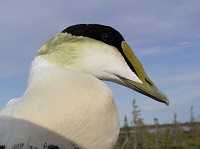Scientists have uncovered a virus that has been causing yearly mass die-offs of eider ducks along Cape Cod, MA, since 1998.
 |
| A common eider--Courtesy of the U.S. Geological Survey's Patuxent Wildlife Research Center |
Researchers from Cornell University, Tufts University and the University of Georgia, as well as from the U.S. Fish and Wildlife Service and the U.S. Geological Survey, reported last month that the prime suspect in the die-offs is a pathogen they dubbed Wellfleet Bay virus (WFBV). The virus affects eider ducks, which are also called common eiders.
WFBV is an orthomyxovirus that places it within the same family as influenza viruses. It is closely related to Cygnet River virus, which was recently discovered and is known to infect ducks in Australia, lead author of the study, Andrew Allison, told the Cornell Chronicle.
Most eiders migrate from breeding grounds found in northern New England and Canada to overwinter on Cape Cod, though there is a small population of the fowl that remains year round. Still, the researchers said it was unclear if the dead birds, which can sometimes reach into the thousands, are from either group or a mix of both.
"We isolated the virus repeatedly, over multiple years of outbreaks, and in many birds, which tells us the virus is definitely playing a contributing role and possibly a major role in the die-offs," Allison said.
He added, however, that the eiders they studied had a host of other health issues that likely contributed to their deaths. "Lots of the birds are emaciated, and lots have parasitic worms in conjunction with the virus, and it's possible another factor like stress or migration may also play a role and trigger the deaths," he said.
The researchers believe WFBV is likely transmitted by ticks or other invertebrates. Identifying the virus, they said, is a big step forward and could lead to ways to treat future outbreaks.
- check out the Cornell Chronicle article
- see the abstract